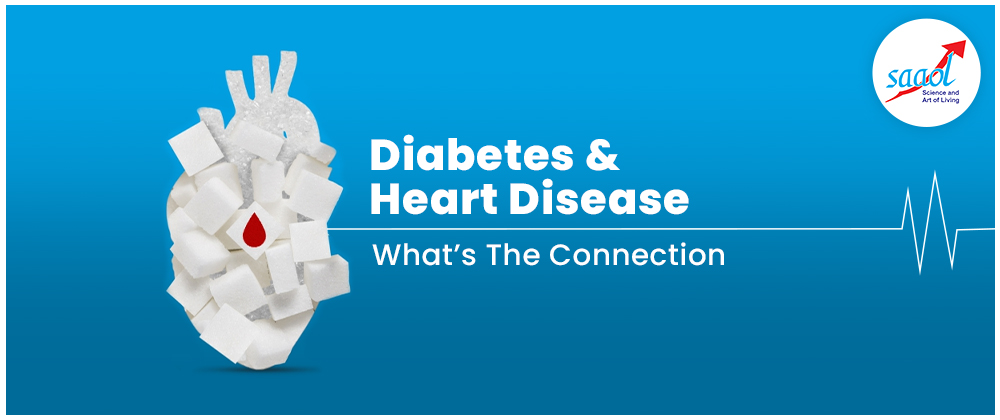Diabetes And Heart Disease: What’s The Connection?
SAAOL
- August 6, 2022
- 4 Min Read

Our heart is a muscle that pumps blood throughout the body. The cells receive oxygen and nourishment through the blood to function properly. When the cells don’t get enough oxygen and nutrients, they don’t work as well. This can lead to health problems, such as heart blockages. For people suffering from heart blockages, SAAOL, Science and Art of Living, offers EECP treatment.
Enhanced External Counter Pulsation also known as EECP treatment for heart blockages, is a safe, effective and non-invasive way to improve blood flow to your heart. At our centre we have found that many of our patients suffered from heart blockages due to diabetes also.
Diabetes is becoming a major cause of heart problems. There are many risk factors for heart diseases, but diabetes is often overlooked. It can lead to heart disease in a number of ways.
- Diabetes can damage the blood vessels. This damage makes it more difficult for blood to flow properly and increases the risk of clot formation.
- It can cause high blood pressure. This, in turn, puts extra strain on the heart and can lead to heart failure.
- It can also, increase the level of triglycerides (a type of fat) in the blood. This can also contribute to the development of heart disease.
If you have diabetes, it is important to control your blood sugar levels and take steps to reduce your other risk factors for heart disease. These steps include eating a healthy diet, exercising regularly, and maintaining a healthy weight.
How should someone with diabetes take care for their heart?
When it comes to managing diabetes, it’s important to think about more than just your blood sugar levels. Taking care of your heart is also essential, as diabetes can increase your risk of developing heart disease.
Here are some tips for taking care of your heart if you have diabetes:
Control your blood pressure
When it comes to your heart health, your blood pressure is one of the most important numbers to know. That’s because high blood pressure is a major risk factor for heart disease and stroke.
Blood pressure is more than 120/80 mmHg is high blood pressure. There are often no symptoms of high blood pressure, so the only way to know if you have it is to get your blood pressure checked.
High cholesterol
When it comes to your heart, cholesterol is not all bad. In reality, your body requires cholesterol to create strong cells. But when there’s too much cholesterol in your blood, it can stick to the walls of your arteries and form plaque. Plaque buildup narrows your arteries and makes it hard for blood to flow through. As a result, a heart attack or stroke may occur. The best way to treat high cholesterol is to maintain a healthy lifestyle.
Obesity
There are many different factors that can contribute to obesity, and once someone becomes obese, it can be very difficult to lose the excess weight. Obesity is a major risk factor for heart disease, as well as diabetes. In fact, obesity is thought to be one of the main reasons why rates of diabetes have been increasing in recent years.
If you are obese, or even if you are just overweight, it is important to try to lose weight. This can be difficult, but there are many different resources and programs available to help people lose weight. Even a small amount of weight loss can significantly reduce your risk of developing heart disease or diabetes.
Sedentary lifestyle
A sedentary lifestyle is a risk factor for your overall health. A sedentary lifestyle is defined as a lifestyle with little or no physical activity. People who are sedentary are at increased risk for developing cardiovascular disease, type 2 diabetes, and obesity.
Technology has made it possible to work from home, and many people spend their leisure time watching television or playing video games. With so many sedentary activities available, it’s no wonder that the prevalence of heart disease and diabetes is on the rise.
But you must remember that small changes can make a big difference when it comes to your heart health. Adding just 30 minutes of moderate-intensity physical activity to your daily routine can reduce your risk of heart disease and diabetes. And if you’re already active, you can further reduce your risk by increasing the intensity or duration of your workouts. So get up and get moving! For your heart.
Heart diseases are rapidly increasing. The possibility of them becoming an epidemic is significantly high. You might not prevent the risk completely but with a healthy lifestyle, you can always reduce it.
